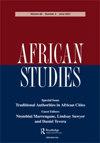Along the museological grain: An exploration of the (geo)political inheritance in Isishweshwe Story: Material Women?
IF 1
4区 社会学
Q2 AREA STUDIES
引用次数: 0
Abstract
ABSTRACT Ostensibly an exhibition on a beloved and widely used ‘South African’ cotton textile isishweshwe, the multi-year Isishweshwe Story: Material Women? exhibition at the Iziko Museums’ Slave Lodge in Cape Town, South Africa, provides an interesting portal through which to explore the manifestation, on the museological stage, of the geopolitics of South Africa as a regional actor. This article adopts a (geo)political lens through which to observe South Africa’s post-apartheid nation-making against the backdrop of historically hegemonic regional relations in Southern Africa. Through this discussion, my aim is to invigorate debates on the sociology of heritage and the public museum by shifting the attention away from the usual emphasis on the domestic politics of nation (re)imagining and transformation. Instead, I recast the debate on museums and heritage in transnational, regionalist terms, emphasising the persistence of geopolitical legacies wherein South Africa discursively collapses the boundaries between itself and its regional neighbours even where these are seemingly acknowledged. To this end, this article reorients the extensive scholarship on South African museums towards an interrogation of the subtle geopolitical dimensions of public museum exhibitions. It invites a focus on the politics and asymmetries of geography and how these intersect with and are (re)produced culturally on the museum platform.沿着博物馆学的脉络:探索伊西什韦故事中的(地缘)政治遗产:物质女性?
摘要:表面上看,这是一场关于深受喜爱并被广泛使用的“南非”棉纺织品伊西什韦的展览,多年的伊西什韦韦故事:物质女性?南非开普敦Iziko博物馆奴隶小屋的展览提供了一个有趣的门户,通过它可以探索南非作为一个地区行动者在博物馆舞台上的地缘政治表现。本文采用(地缘)政治视角,在南部非洲历史上霸权区域关系的背景下,观察南非后种族隔离国家的形成。通过这次讨论,我的目的是通过将注意力从通常对国家(重新)想象和转型的国内政治的强调转移开,来激发关于遗产社会学和公共博物馆的辩论。相反,我用跨国、区域主义的术语重新描述了关于博物馆和遗产的辩论,强调了地缘政治遗产的持久性,在这种遗产中,南非随意打破了自己与地区邻国之间的界限,即使这些界限似乎得到了承认。为此,本文重新定位了对南非博物馆的广泛研究,以探究公共博物馆展览的微妙地缘政治层面。它邀请人们关注政治和地理的不对称性,以及这些问题如何与博物馆平台上的文化交叉并(重新)产生。
本文章由计算机程序翻译,如有差异,请以英文原文为准。
求助全文
约1分钟内获得全文
求助全文

 求助内容:
求助内容: 应助结果提醒方式:
应助结果提醒方式:


